
Medical facilities and big healthcare organizations are tasked with the responsibility of managing a sizable inventory. A Hospital Management Inventory is basically a stock or data of all the medical resources such as equipment, medicines, and patient’s health data that are generally found in any small or large healthcare facility.
While many hospitals have inventory management techniques in place, over half of those polled were manually managing their inventory using basic Excel sheets until the information technology(IT) showed it wonders. Regrettably, supply chain expenses are expected to be the largest cost to healthcare systems this year, exceeding labour costs for the first time.
The global hospital asset tracking and inventory management systems market size is expected to grow from $23.23 billion in 2021 to $25.12 billion in 2022 at a compound annual growth rate (CAGR) of 8.2%.
The industry size for hospital asset monitoring and inventory management systems is projected to increase at a compound annual growth rate (CAGR) of 8.2% from $23.23 billion by 2021 to $25.12 billion by 2022.
Thus, health institutions should prioritize using a technology to aid in inventory management processes in order to cut costs, labor, and energy and maintain their inventories more accurately.
Do you want to know how? Let’s discuss the management systems and everything you must know about hospital inventory management in this article below!
1. Hospital Inventory Management
Hospital or Healthcare Inventory Management can also be called SCM (supply chain management).
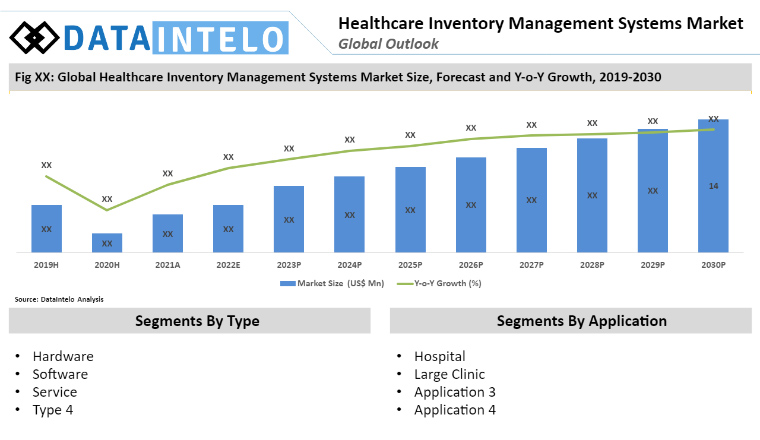
It is a workflow that keeps track of your health system’s inventories, transactions, bookings, payments and other details. In healthcare firms that need to monitor medical products, order and administer drugs, or sell health items to patients, an inventory management system is essential. Inventory management solutions assist major firms avoid financial and product losses by maintaining a precise and up-to-date record of items and resources.
In the medical world, everybody including the doctors/nurses and other healthcare providers seems to be focussing on providing high-end patient care. Managing hospital inventory can be a challenging task because you need to monitor everything from tracking medical supplies and purchasing equipment, monitoring for any spare medications, etc. Hospital staff units have to take care of a lot of things and managing them in an old fashioned way is simply much more time consuming.
In order to solve the hectic task and to automate the process of managing the inventories, Healthcare Inventory management softwares is here to solve this problem. . But before going ahead and discussing more about healthcare inventory management softwares, let’s further explore more about the challenges faced earlier that will be solved by these softwares.
2. Challenges in Hospital Inventory Management
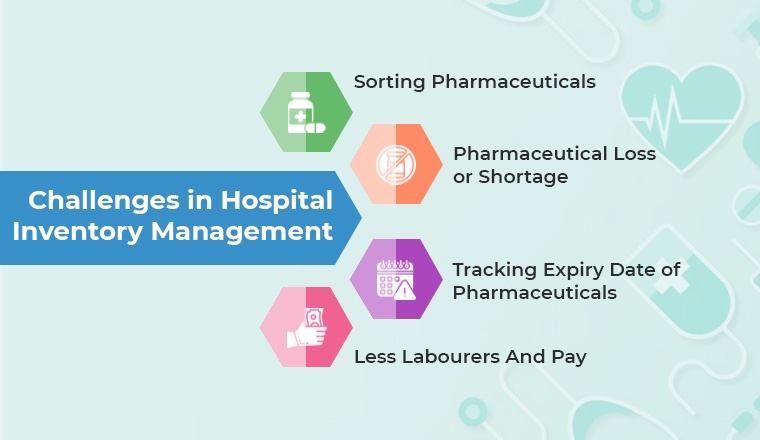
2.1 Sorting Pharmaceuticals
Frequently, nurses are responsible for tracking and managing hospital supply chain. Additionally, physicians waste time compiling lists of required medical supplies and instruments.
2.2 Pharmaceutical Loss or Shortage
Emergencies are a frequent occurrence in healthcare facilities. As a result, it is critical to maintain an adequate supply of medical equipment and resources. Certain products, on the other hand, have a storage life. As a result, it is critical to rotate it out on schedule.
2.3 Tracking Expiry Date of Pharmaceuticals
When the supplies are stocked up for emergencies, it becomes more challenging for the staff to keep a regular track on expiries of different items at a time and as a result sometimes many healthcare providers tend to pass on expired medical items to the patients.
2.4 Less Labourers And Pay
Focusing too much on cost-cutting leads to improper and mannerless workflow sometimes. Due to less labour pay, staff tend to neglect minor important things that again adds up a lot to a patient’s health and creats a challenge for them.
3. What is Hospital Inventory Management Software?
Aarogya #HospitalSoftware can help you make quick decisions related to the day-to-day operations and help you grow & regulate your business into something bigger and better than it was before.
— Aarogya : Hospital Management Software (@aarogyahms) May 19, 2022
For More Details: +91-9415406114 or visit: https://t.co/2DZcMCHNZB#HealthcareForAll pic.twitter.com/cqzTOJja6S
Hospital inventory management software assists in tracking the consumption of all items inside the healthcare institution. Such inventory This system software enables the healthcare business or organisation to keep records of sales and expenditures. It also identifies and accounts for edible and non-consumable drugs or goods.
Here’s what the famous oncologist of India has to say:
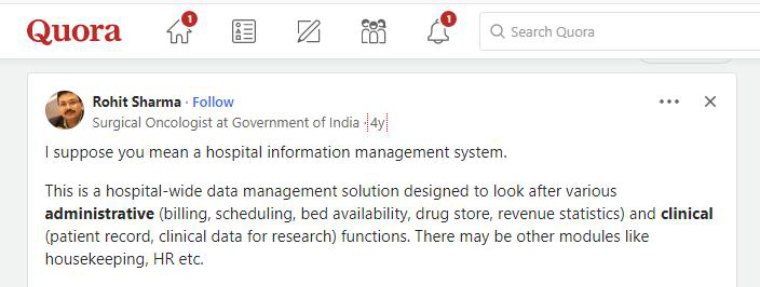
In any medical facility, the most often utilised resouces are medications and surgical instruments. All facilities must keep a sufficient supply of life-saving medications, needles, and sterile surgical instruments such as injectors, aprons, and gloves.
Keeping everything handy in stock is a professional’s job but making everything accessible to the patients in a certain regular flow while keeping a record of every item is the hospital inventory management software job. Not to mention the fact, you are just a robust software away to deal with all the medical challenges we discussed above.
With hospital inventory management software, hospitals, as well as several healthcare companies, can eliminate all the outdated, inefficient inventory tracking methods. Also, here controlling their inventory, tracking assets is no big deal. Everything can be easily taken care of. You know having a full-fledged, secure, cloud-based system on hand can offer a wide range of benefits. Inventories can be categorized in several ways such as distributing medications on the basis of their expiry dates or registering equipment with its maintenance details, etc.
As a solo medical professional, handling inventories won’t be an issue but when it’s about an entire hospital or warehouse where stakes are high and everything has to be present at a larger scale, you need inventory management software. By applying these inventory management software, you will find yourself spending the least amount of time worrying regarding inventory and more time in providing the best care for your patients.
4. Benefits of Healthcare Inventory Management Software
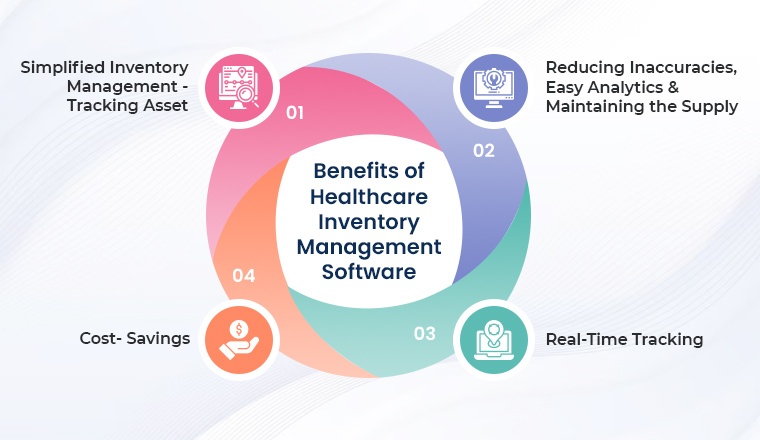
4.1 Simplified Inventory Management – Tracking Asset
If you want to make the process of inventory management seamless, you simply have to use the healthcare inventory management software.
Healthcare stocks and supplies keep on fluctuating at a large scale – all thanks to the present unpredictable scenario. An ideal inventory management software can definitely automate these tedious procedures and reduce human effort so that they can focus on taking care of their patients.
4.2 Reducing Inaccuracies, Easy Analytics & Maintaining the Supply
Inventory & stock management is not a one-time procedure. It is an ongoing process happening throughout the year. Earlier, when all these tasks were done by humans, the result was pretty much inaccurate and this resulted in improper stock management.
With the adoption of an inventory management system, there is no air around. Data is being recorded and tracked pretty much precisely. Also, almost all your orders can be synchronized and stock levels get adjusted whenever you make a sale.
4.3 Real-Time Tracking

The program built in the software enables real-time tracking, this implies that the inventory is regularly refreshed up to date which gives you access to a precise counted inventory whenever you add or sell items.
Additionally, you may manage inventory transactions and have them regularly reordered when supplies runs low. If the goods does not arrive at its location, you will be notified. Isn’t it brilliant?
4.4 Cost- Savings

Streamlining your inventory management is cost savings. Till now you had a fair chance of eliminating the inventory costs associated with human errors but what’s more! Well, firstly, inventory management software can save you from having nightmares of running out of supplies.
In addition, it also reduces the scope of over drugs. This is not it! The biggest news of all is automation. Earlier a significant loss has been observed due to stock-outs and overstocks. But not anymore! All thanks to the inventory management systems.
5. Hospital Inventory Best Practices to Follow
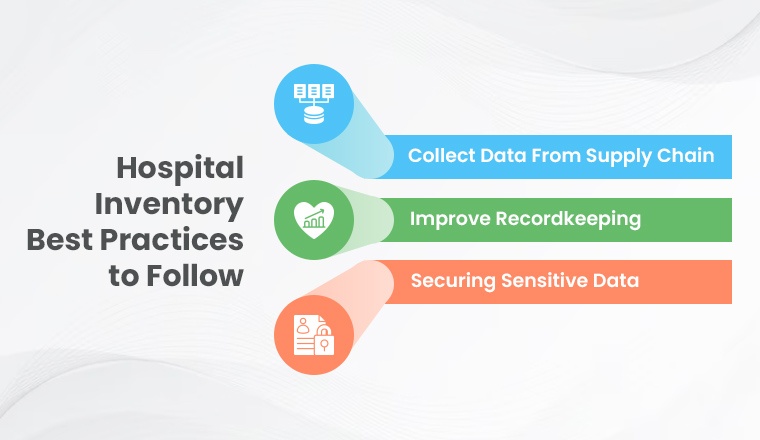
5.1 Collect Data From Supply Chain
With the help of the supply chain, data healthcare businesses can save a lot of money. And further, businesses can use that data to identify whether the techniques used in inventory management are cost-effective or not.
Failure in using supply chain data effectively may lead to millions of cheque in lost revenue. Rather than that, one must take the data into consideration to analyse whether your inventory management system is as efficient as it is supposed to be.
With the concern of society’s health and the easy wonders of IT, more firms are trying to establish IT platforms that support value-based models. By adopting these practises, healthcare ventures may establish a more precise correlation between the materials required and clinical outcomes.
5.2 Improve Recordkeeping

In case, if you aren’t using one already, chances are pretty high of you considering a platform that knows how to differentiate between the current stock and will it be in demand in the future? Here records must be reviewed at regular intervals so you know there is no scope for error. In the end, you get a smooth hospital inventory supply management.
5.3 Securing Sensitive Data
Each healthcare practitioner is acquainted with HIPAA, that safeguards patients’ health history from unauthorised access. It is critical to maintain the same level of safety for your inventory system, as your stockpile is what enables you to offer service to the patients you treat.
If unauthorised staff enter incorrect inventory counts or other data inconsistencies, it may create havoc in hospitals and other facilities that rely on discipline and accuracy to function successfully. Therefore, practising security is one of the major do’s one should follow.
6. Conclusion
Surviving in the hospital sector is not easy but it is a necessity and having an inventory system can definitely ease your work. With the help of a hospital inventory management software, you don’t have to compromise on your patients anymore. Feel free to get in touch with us for an efficient and automated healthcare inventory management software.





You are great at conveying the content in a brief and understandable manner. I liked how you busted the myths which were clogging the inventory management best practices. I clearly agree that implementing the points and inputs mentioned by you will uplift the efficiency of healthcare inventory management.
This blog provides valuable insights into the benefits and features of hospital inventory management software. The content is well-structured and easy to understand, making it a helpful resource for hospital administrators and staff looking to streamline their inventory management processes.
After reading this article, I now have good knowledge about Hospital Inventory Management because it describes what it is, its challenges, benefits, and best practices. Thanks for sharing!
As a healthcare professional, I know that Surviving in the hospital sector is not easy, but it is a necessity. After reading this article, I can say that hospital inventory management software can definitely ease My work. With its help, I don’t have to compromise with my patients' data anymore.
Thank you for sharing your insights on hospital inventory management. I found the section on the challenges of hospital inventory management to be particularly interesting. I think it's important to be aware of these challenges in order to choose the right healthcare software solution.